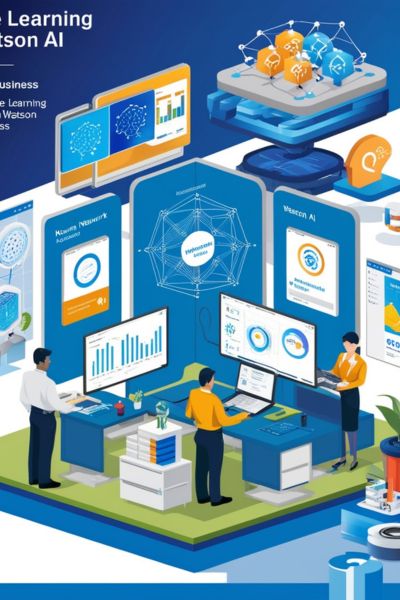Machine Learning with Watson AI
|
Future of Watson AI Related Blog |
|
1.AI Ethics & Watson AI |
|
2.Cognitive Services with Watson AI |
|
3.Natural Language Processing (NLP) with Watson AI |
|
4.Machine Learning with Watson AI |
|
5.IBM Watson AI |
|
6.Watson AI |
Machine Learning with Watson AI: Revolutionizing Business Efficiency
In today’s data-driven world, machine learning (ML) has emerged as a cornerstone for innovation and efficiency across industries. For startups and small businesses, navigating the complex landscape of ML can seem daunting. IBM’s Watson AI offers a robust and accessible platform that simplifies ML adoption, enabling businesses to harness the power of predictive analytics, automated model building, and real-world applications. This blog explores how Watson AI democratizes machine learning, making it a game-changer for businesses of all sizes.
ML Basics with Watson AI: Watson ka Machine Learning Kaise Kaam Karta Hai?
Watson AI leverages cutting-edge machine learning algorithms to analyze large datasets, identify patterns, and deliver actionable insights. Unlike traditional ML platforms that require extensive programming expertise, Watson AI offers user-friendly tools that allow even non-technical users to build and deploy models effectively.
- Pre-built Models: Watson provides pre-trained models for tasks like natural language processing (NLP), image recognition, and sentiment analysis.
- Custom Training: Businesses can customize models using their own data to address specific challenges.
- Cloud Integration: Watson’s cloud-based infrastructure ensures scalability and accessibility.
By automating complex ML tasks, Watson reduces the learning curve, making advanced analytics accessible to startups and small businesses.
Predictive Analytics: Tools And Frameworks
Predictive analytics is a core strength of Watson AI. It helps businesses anticipate trends, optimize operations, and improve decision-making. Watson AI integrates with various tools and frameworks to enhance predictive capabilities.
- Watson Studio: This collaborative environment enables data scientists and business analysts to prepare data, build models, and visualize insights.
- SPSS Modeler: A drag-and-drop interface simplifies the creation of predictive models.
- Watson OpenScale: Watson OpenScale: Keeps an eye on and controls AI models to guarantee accuracy, explainability, and fairness.
Example:
A small e-commerce startup used Watson Studio to analyze customer behavior and predict purchasing trends. By tailoring their marketing strategies, they increased sales by 25% within six months.
Here’s a list of 15 tools related to machine learning with Watson AI:
- Watson Studio: A collaborative environment for building and training machine learning models.
- AutoAI: Automates the process of preparing data and building ML models.
- Watson Machine Learning deploys and manages ML models at scale.
- Watson OpenScale monitors and manages AI models to ensure fairness and accuracy.
- SPSS Modeler: A data mining and predictive analytics platform integrated with Watson AI.
- Watson Knowledge Catalog: Helps organize and govern machine learning assets and datasets.
- Watson Visual Recognition analyzes image data to detect objects, scenes, and other visual elements.
- Data refinery simplifies data preparation and transformation for machine learning workflows.
- Watson Discovery: applies ML techniques to extract insights from unstructured data.
- Watson Personality Insights: Uses ML to infer personality characteristics from text data.
- Watson Natural Language Understanding (NLU): Uses ML for sentiment analysis and entity recognition.
- Watson Assistant: Combines ML with NLP to create intelligent conversational agents.
- Deep Learning as a Service: Provides frameworks for building and deploying deep learning models.
- Watson Text to Speech: Converts text into audio with neural-based speech synthesis models.
- Cloud Pak for Data – An integrated platform that supports ML model deployment and scaling.
Automated Model Building: Watson Studio Aur Watson OpenScale ke Saath
One of Watson AI’s most notable capabilities is its automated model development. Here’s how Watson OpenScale and Watson Studio streamline the procedure:
- Data Preparation: Watson Studio provides tools for data cleansing and transformation, ensuring high-quality inputs for ML models.
- Model Training: Predefined algorithms and AutoAI technology automate the training and optimization of models.
- Model Deployment: Deploy models seamlessly with Watson’s integrated platform.
- Performance Monitoring: Watson OpenScale continuously evaluates model performance and mitigates biases.
Example:
A healthcare startup leveraged Watson OpenScale to develop a diagnostic tool that identifies early signs of chronic diseases. The automated insights reduced diagnosis time by 40%, enhancing patient outcomes.
Real-World Applications: Watson AI Machine Learning Models Se Business Problems Kaise Solve Karte Hain?
Watson AI’s machine learning capabilities are transforming industries by addressing real-world business challenges:
- Retail: Personalized recommendations and inventory optimization.
- Healthcare: Predictive diagnostics and patient management.
- Finance: Fraud detection and risk assessment.
- Manufacturing: Predictive maintenance and quality control.
Example:
A logistics company integrated Watson AI to optimize delivery routes using predictive analytics. This reduced fuel costs by 20% and improved delivery times by 15%.
How Startups and Small Businesses Can Benefit
Startups and small businesses often operate with limited resources, making cost-effective and scalable solutions essential. Watson AI provides several advantages:
- Affordability: Pay-as-you-go pricing and cloud-based solutions reduce upfront investment.
- Ease of Use: Intuitive interfaces and automated tools eliminate the need for extensive technical expertise.
- Scalability: Start small and expand capabilities as your business grows.
Actionable Advice:
- Start Small: Identify a specific business problem and use Watson’s pre-built models to address it.
- Leverage Free Resources: IBM offers tutorials, free trials, and community forums to help users get started.
- Focus on ROI: Prioritize use cases that deliver measurable value, such as customer retention or operational efficiency.
Conclusion
Machine learning is no longer a luxury reserved for tech giants. With Watson AI, startups and small businesses can leverage advanced analytics to solve complex problems, improve efficiency, and drive growth. By combining user-friendly tools, affordability, and real-world applications, Watson AI empowers businesses to innovate and compete in today’s dynamic market.
Are you ready to transform your business with Watson AI? Start exploring its potential today and unlock new opportunities for success. What challenges would you address first with Watson AI? Share your thoughts below!
Top 10 FAQs
1. What is Watson AI and how does it work?
Watson AI is IBM’s advanced AI platform that uses machine learning algorithms to analyze data, identify patterns, and deliver insights. It offers tools for predictive analytics, automated model building, and more.
2. Can Watson AI be used by non-technical users?
Yes, Watson AI’s user-friendly interfaces and pre-built models allow even non-technical users to build and deploy machine learning models.
3. What are the main tools available in Watson AI?
Key tools include Watson Studio for model building, SPSS Modeler for predictive analytics, and Watson OpenScale for monitoring AI models.
4. Is Watson AI affordable for small businesses?
Absolutely. With pay-as-you-go pricing and cloud-based solutions, Watson AI is accessible to startups and small businesses with limited budgets.
5. What industries can benefit from Watson AI?
Watson AI is versatile and can be used in retail, healthcare, finance, manufacturing, and many other sectors.
6. How does Watson AI ensure the fairness of its models?
Watson OpenScale provides tools to monitor model performance, detect biases, and ensure fairness and accuracy in predictions.
7. What is AutoAI in Watson Studio?
AutoAI automates the process of model training and optimization, making it easier to create effective machine learning models.
8. Can Watson AI integrate with existing business tools?
Indeed, Watson AI facilitates interaction with a number of frameworks and tools, guaranteeing smooth cooperation with current processes.
9. What are some real-world examples of Watson AI in action?
Examples include e-commerce startups optimizing customer behavior analysis and healthcare companies reducing diagnosis time through predictive models.
10. How can I get started with Watson AI?
Begin by exploring IBM’s tutorials, free trials, and community forums. Identify a specific business problem and use Watson’s pre-built models to address it.




0 Comments